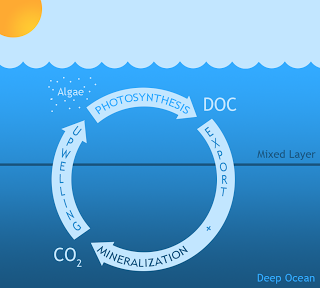 ©2020 Biological and Chemical Oceanography Data Management Office.
©2020 Biological and Chemical Oceanography Data Management Office.Funded by the U.S. National Science Foundation
Sinking particles are a major element of the biological pump and they are commonly assigned to two fates: mineralization in the water column and accumulation at the seafloor. However, there is another fate of export hidden within the vertical decline of carbon, the transformation of sinking organic matter to fine suspended and/or dissolved organic fractions. This process has been suggested but has rarely been observed or quantified. As a result, it is presumed that the solubilized fraction is largely mineralized over short time scales. However, global ocean surveys of dissolved organic carbon are demonstrating a significant water column accumulation of organic matter under high productivity environments. This proposal will investigate the transformation of organic particles from sinking to solubilized phases of the export flux in the Ross Sea. The Ross Sea experiences high export particle production, low dissolved organic carbon export with overturning circulation, and the area has a predictable succession of production and export events. In addition, the basin is shallow (< 1000 m) so the products the PIs will target are relatively concentrated. To address the proposed hypothesis, the PIs will use both well-established and novel biochemical and optical measures of export production and its fate. The outcomes of this work will help researchers close the carbon budget in the Ross Sea.

Principal Investigator: Alexander B. Bochdansky
Old Dominion University (ODU)
Principal Investigator: Giacomo DiTullio
College of Charleston (CofC)
Principal Investigator: Robert B. Dunbar
Stanford University
Principal Investigator: Dennis Hansell
University of Miami Rosenstiel School of Marine and Atmospheric Science (UM-RSMAS)
Principal Investigator: Monica V. Orellana
Institute for Systems Biology (ISB)